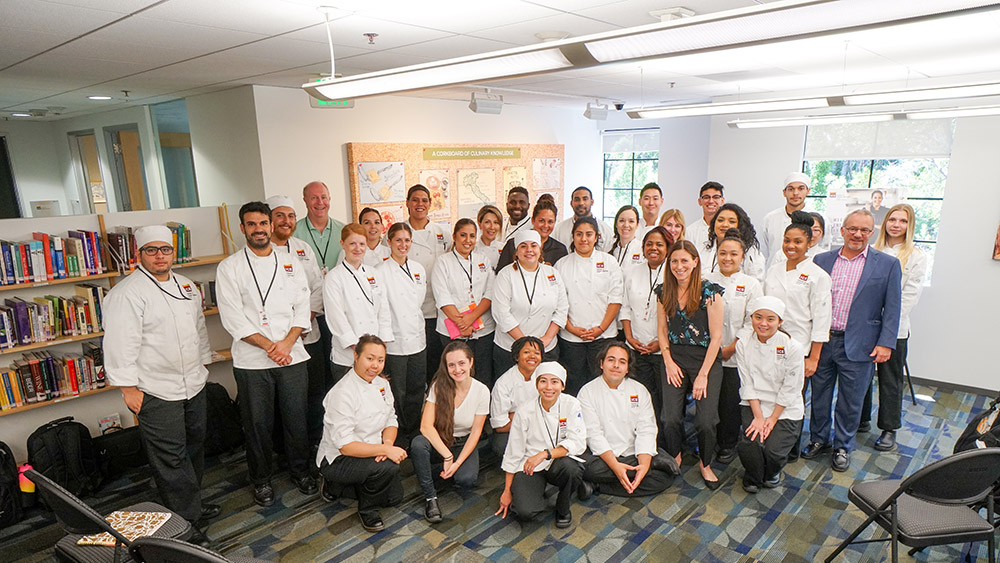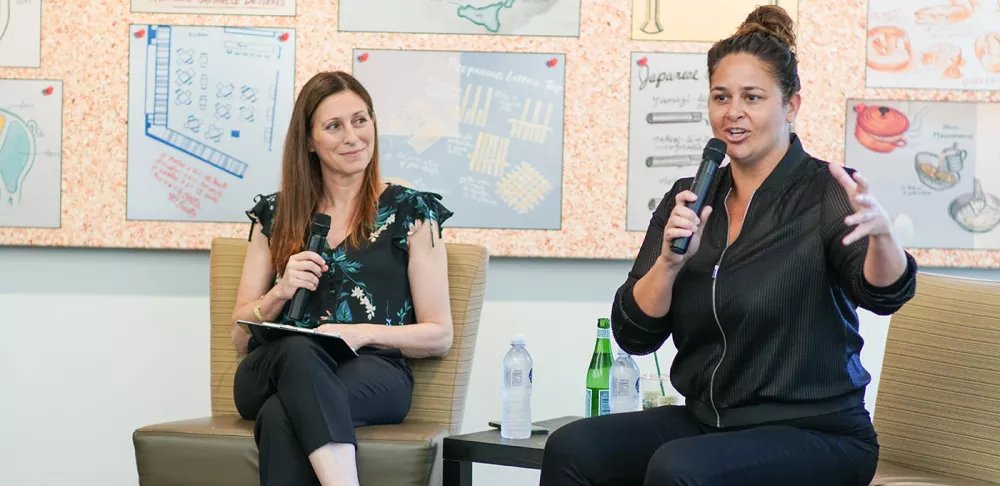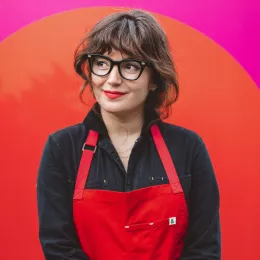Though her entry into the food industry involved slinging hot dogs on a stick at the local mall, Antonia Lofaso has since taken the Los Angeles culinary scene by storm.
Growing up in a tight-knit Italian-American family on Long Island, Antonia developed a love of food from a young age. When her family moved to California, sizzling fajitas at El Torito sparked her “aha!” moment at 11 years old. Here are Antonia’s insights from education to restaurant success since.
What was culinary school like for you?
Being in culinary school was like finding my people. While some people like to go shopping for shoes, I got really excited to go to Bed Bath & Beyond to look at ladles. There was just this element of loving all of the aspects of hospitality, wanting to create beautiful tablescapes, figuring out what we were making for Thanksgiving dinner in July and making menus. It just developed into this world.
How did you land your job at Wolfgang Puck’s Spago?
I did a 10-hour stage in the kitchen, and I had to do the most ridiculous [tasks]: peel 1,000 potatoes, pass 100 mashed potatoes through a tamis. I thought, I have to do this as fast as I possibly can; I need to do this as efficiently as I possibly can. I had my chef instructor’s voice in my head over and over saying, “Be efficient, be quick, keep your head down; say, ‘yes, chef.’” I was trying to do all of these things in the hopes that I would get a job. After about 10 hours, he said, “We’ll put you on garde manger three at lunches. You’ll make $7.50 an hour.” I responded, “Thank you so much. God bless you.”
Given how much confidence you exude now, that seems hard to believe. How did that transition happen?
There was no confidence in the beginning. I knew I wanted to do this thing, I wanted to cook so desperately, I wanted to be so good at it. I knew I just needed to absorb everything I possibly could in this kitchen. It’s the one thing that I love to tell young cooks: Nothing can outweigh your education in technique. There’s just nothing else that you need to work on in the very beginning other than honing incredible technique. You can really only do that by working in incredible restaurants that hold that standard for technique — it’s as simple as that.
Eventually, you left Spago. What was that like?
Yes, after about eight or nine years, and it was probably one of the scariest things I ever did. Working for such an incredible corporation and a chef that has so much notoriety in the best possible way, I didn’t want to leave that comfort. I knew if I didn’t venture out and make myself truly uncomfortable again, like I was uncomfortable when I first started, that there wasn’t going to be much growth.
How did you wind up on “Top Chef”?
After that, I worked for SBE [Enterntainment Group] in more of a nightlife environment. They do great things, but it wasn’t the right fit. I had just turned 31 years old and wanted to say yes to things, to see what else was out there, and develop my skills and opinions in the hospitality industry. At that time, there were certain chefs who turned their noses up at the idea of doing cooking shows. So, I struggled with that, and then I had had this epiphany: I’m a grown-up. I have a child. I have a job. Why am I so worried about what this community of people may or may not think of me? I am going to make my own decision, and I’m going to go ahead and do it. I did, and I was petrified.
Sounds like a pivotal moment in your career.
Honestly, it was the most incredible experience I probably could have ever been a part of. It was an opportunity to come across some of the most incredible chefs — Eric Ripert, Anthony Bourdain, Daniel Boulud, Tom Colicchio — who actually spent a lot of time with us and gave us a ton of feedback and mentorship throughout the entire experience. I don’t think I could have traveled enough or been in those kinds of restaurants and received that kind of one-on-one attention with people who genuinely cared about whether or not I did an oxtail ragout correctly and provided strong feedback.
What were the long-lasting effects of being on the show?
When I look at opening a fourth restaurant and think about the nerves and the cycle of emotions that come with opening a restaurant — the scenario where you are sick to your stomach wondering, are people going to come, is this going to be good, do I even know what I’m doing? You go through this insane cycle of events, but after having done this incredible competition show and having that pressure applied, when I open restaurants I think, it can’t be any worse than when I was forced cook at a Target at three o’clock in the morning in New Jersey, I’ll be fine. It’s this relative experience of pressure that was very helpful for everything else that I’ve done.

What was the business process when you opened your first restaurant, Black Market?
There’s usually a hard struggle. There’s a huge creative element to what we do. Sometimes the creative element fights with the money because at the end of the day we all want to create the best product. At the end of the day, it’s a business — your numbers need to make sense. Otherwise, you just have a very expensive hobby. That’s often hard for the creative to swallow, understanding that as much as you want these incredible products on this menu, they don’t really fit the environment or the price point of the neighborhood that you’re in or the menu you’re creating.
You don’t know how much you even need to make until you know your base rent for exactly where you are. You start with rent, your opening budget, what you need to make for the year and how long the build-out is going to be. At that point, you’re going to open in 30 days, but you’re not going to have customers for 30, 60 or 90 days. So you’re looking at your labor, food costs, complete and total overhead. You’re not going to be making a dollar until you’re six months in, and hopefully, you’re breaking even by a year if you’re trying to recoup what you put in. The goal is to have everything paid back in two years. If you want to make some money, it’s about the bar program. We can get blinded by our need to create an incredible menu, thinking that it’s all about the food. And it is, for the record, but there’s an entire experience that happens before guests even get to your food, and all of those elements need to match in order for people to have the right experience.
What’s the first thing you think about when building a restaurant?
The feeling that I want to exude in the place and whether the neighborhood needs it. You can’t just decide to open up an Italian restaurant if there are 18 other Italian restaurants in the area. Once you have a strong concept, everything needs to match. Most people can’t articulate a disconnection in a restaurant, but they know it just doesn’t feel right. Most hospitality and restaurant people can spot it immediately. You walk in, the host stand feels weird, the lighting is off, the music is strange, you don’t like the glass the wine was served in — you’re already annoyed and you don’t know why. Then you sit down, the silverware feels terrible and now they want to charge $95 for a steak? Everything needs to feel fluid. That’s why it’s so important for the chef to work with front-of-house managers, the bar program, every single element — not a separation of FOH and BOH.
What do you look for when you’re hiring?
I look for a growth mindset: someone really understanding where they want to see themselves in the next five or 10 years, having that be a tangible goal and being willing to really do anything. Not having any limitations of what they want to do, what they want to learn, and that they just want to come in and be a part of a team. If any person came into the restaurant and said they want to be a part of a team that creates great food and I can work any day of the week at any station, I would say, you’re hired. Because, it is just a very positive let’s go for the team, let’s learn everything there is to learn in the kitchen, let’s create great food and let’s put out a good product. That’s what everyone is looking for. And then, that character builds into your technique. And then consistency. You can have this go get ‘em attitude that is followed by incredible technique that is then coupled with consistency, showing up for your shifts.
How do you balance being a mom and being in the restaurant business?
I grew up in a household where quality of time wasn’t actually quantity of time. Those are words that I live by. My father is one of the most incredible human beings on the planet — I would probably say the best father in the world — and I barely saw him as a child. The quality of time that I got from him in moments over the course of my life, as he was working to provide for our family, I looked at it in a way that made me understand that being a parent was more than just being next to your child at all times. I can be an effective parent and still work. That being said, I have an incredible family that has helped me throughout this entire process. I have been able to rely on parents to help raise her as a community.
It’s also about giving away that power a little bit. Parents feel like we need to do it all. Sometimes we don’t talk about the community of people that raise our children, and the community of people is stronger than one of us, and that’s okay.
My daughter’s now 19-years-old, and when she’s recently gone to apply for a job, there’s a confidence about her that shows she grew up thinking that she can do whatever she wants to do. She has choices, and I’d like to think that somewhere along the line of me parenting the way I parented that I’ve given her that kind of confidence.
Pursue a career in restaurant management at ICE.




